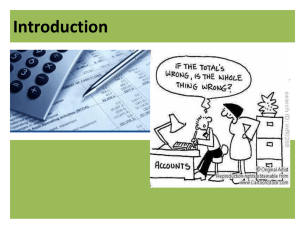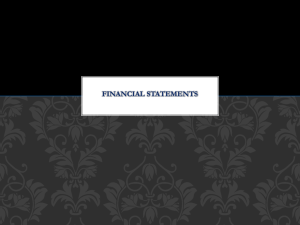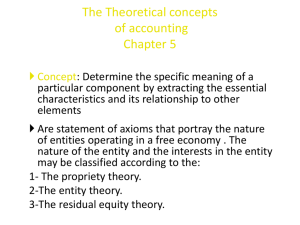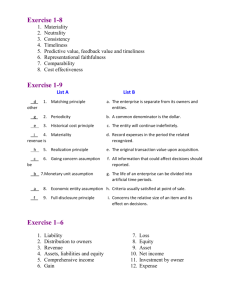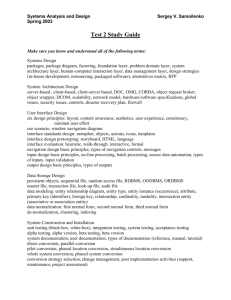History of Accounting Thought
advertisement
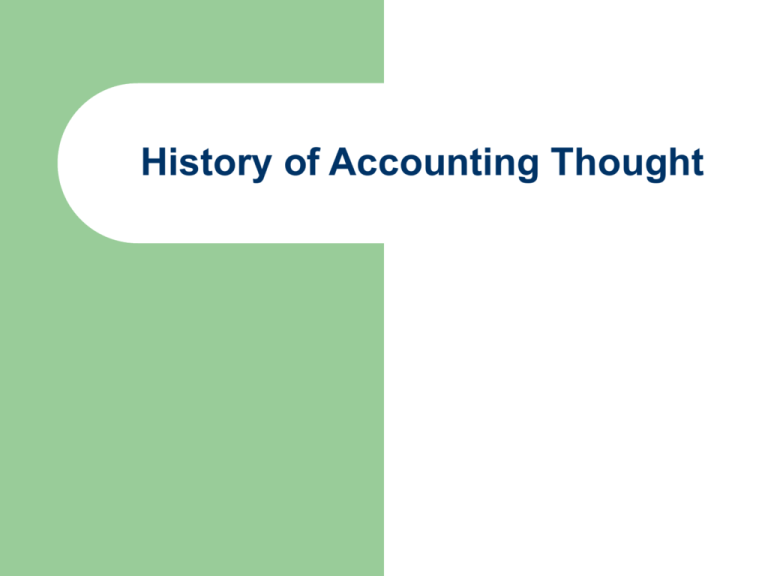
History of Accounting Thought Accounting is a function of the society and environment (Principles, procedures, concepts etc. are governed) E.g. Industrial revolution, Hike of oil prices, corporate social responsibility No much contribution from countries like India, Sri Lanka (Development stage, academic research ?) The importance of knowing history: to understand the; – Present condition & – What will happen in future The Development Early forms of measurement record keeping – Before even 4000 B.C. Clay Tablets were used in Mesopotamia for recording purposes – In 600 B.C. – Advent of Coinage changed the form of record keeping methods. But had a very limited influence due to very slow adoption Earliest written documents in Accounting – Accounting records are found in Babylonia, Egypt, China and India – Most of the records are in physical quantities – Greeks and Romans expressed both in money and goods Purposes of these records – To keep track – Exercise control over (the wealth entrusted) The Stewardship Function – The statement prepared is the ‘Charge and Discharge Statement’ for one year – The Charge Section: Cash and goods held at the beginning + collected during the year by the steward – The Discharge Section: Cash and goods expensed by the steward on behalf the owner The Practice of the Double Entry System – Not known when and where originated – Was described by Luca Pacioli – Without any change still it is in practice The Industrial Revolution: – Had a profound effect on Accounting – Invention of powered machinery, factories, large scale production required changes in accounting. The main change is from domestic system to factory system – Under domestic system: records had to be kept to ensure they are not used for their own use The Industrial Revolution: (Contd..) – Factory System + Railways lead to depreciation accounting, cost accounting techniques (Fixed Cost Vs Variable Cost, Overhead Allocation & Absorption) etc. Development from Pacioli to Present Day The development is divided in to 5 arbitrary stages for convenience; 1. 1494 – 1775 – Period of stagnation – Society changed very little – Social and economic development was very low – Predominant form of business was sole proprietorships 2. 1775 – 1850 – Also a period of stagnation – Business form: sole traders, but some partnerships may have existed Development from Pacioli to Present Day 3. 1850 – 1900 – Post industrial revolutionary period – Businesses were in corporate form – The entity concept was emphasized – The P& L got more prominence than B/S – The Audit function was important 4. 1900 - 1950 – Emphasis changed from stewardship function to decision accounting – Cost accounting methods were improved – In UK the P&L become mandatory along with the B/S Development from Pacioli to Present Day 5. 1900 – present day – Has grown very rapidly – New concepts such as green accounting, environmental accounting, human resources accounting, forensic accounting has emerged – Has stepped in to a knowledge paradigm Theories of Accounting 1. The proprietary theory: – According to this theory the content and measurement principles underlying the FS is focused on placing the owner at the centre. All observations are done on his (owners) view point – E.g. Assets are things owned, liabilities are debts owed. – Acc Equation: A – L = Equity – Applicable more on sole proprietorships and partnerships – More Balance Sheet oriented Theories of Accounting 2. The Entity Theory: – Net income doesn't belong to the proprietors, but to the entity, which is separate from the owners – Now the centre is the business organization – A = L + E (resources are owned by the company) – More P&L oriented – Suitable for corporations Theories of Accounting 3. The Residual Equity Theory: – Much related to proprietary theory – But the main difference is that it excludes the PS capital from proprietary group (E.g. EPS) – Assets - Specific Equity = Residual Equity – Specific Equity = Claims to all creditors + PS holders – Ordinary shareholders are bearers of residual risk + residual awards – Prime objective is to provide better information to Ordinary Share Holders for investment decision making (based on future dividends) Theories of Accounting 4. The Enterprise Theory: – Emphasizes the social responsibility of an entity (the impact through its activities) – The concentration is not only on SHs – Hence, it is an extension of entity theory as it covers more stakeholders (employees, customers, community, government, society etc.) – Broad concept of Income: Value added (Mkt price of the output – price of the goods acquired) Salaries, Dividends, Interest, Taxes etc. Theories of Accounting 5. The Fund Theory: – The entity is viewed as a fund – Neither the owner nor the entity is used as the basis of accounting – The activity oriented unit (the Fund) is used as the basis of accounting – The Accounting unit consists of economic resources (fund) and related obligations and restrictions to use of resources – Assets = Restriction of Assets – More asset centered – The fund statement gets the prominence – More suitable for govt. and non profit organizations

